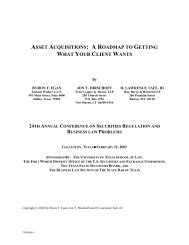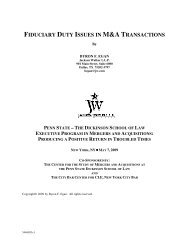Early Termination and Liquidation Provisions in Energy Trading and ...
Early Termination and Liquidation Provisions in Energy Trading and ...
Early Termination and Liquidation Provisions in Energy Trading and ...
Create successful ePaper yourself
Turn your PDF publications into a flip-book with our unique Google optimized e-Paper software.
dollar value threshold to elim<strong>in</strong>ate normal bus<strong>in</strong>ess disputes <strong>and</strong> <strong>in</strong>consequential defaults. While crossdefaultprovisions typically contemplate cross-default upon a failure to make a payment under anotheragreement between the parties, this new cross-default provision addresses the failure to make payment to athird party under any agreement. 23 The enables a party to term<strong>in</strong>ate the contractual relationship when itscounterparty beg<strong>in</strong>s to default on its payment obligations to others without be<strong>in</strong>g forced to wait for thecounterparty to default on a payment obligation to the party. However, due to difficulties <strong>in</strong> discover<strong>in</strong>g <strong>and</strong>determ<strong>in</strong><strong>in</strong>g whether a default has occurred <strong>and</strong> whether the applicable threshold has been exceeded,enforcement of this event of default is often very difficult. 24 If a party <strong>in</strong>vokes this event of default suchparty risks be<strong>in</strong>g liable for wrongful breach of the master agreement. Further, confidentiality obligations maybe breached <strong>in</strong> obta<strong>in</strong><strong>in</strong>g the <strong>in</strong>formation necessary to make such determ<strong>in</strong>ations, which could have adverseconsequences for both the party breach<strong>in</strong>g the obligation <strong>and</strong> the party receiv<strong>in</strong>g the <strong>in</strong>formation.A similar event of default aris<strong>in</strong>g <strong>in</strong> the wake of Enron’s bankruptcy occurs when an event of default or otherdefault occurs under any agreement that a party has with any third party. This is tremendously broad,extend<strong>in</strong>g beyond payment defaults or defaults under enumerated events of default, <strong>and</strong> has the <strong>in</strong>herentadvantage of ensur<strong>in</strong>g that a counterparty will never be forced to wait on the sidel<strong>in</strong>e, unable to act when acounterparty beg<strong>in</strong>s slid<strong>in</strong>g toward the default of all of its obligations. However, <strong>in</strong> addition to rais<strong>in</strong>g<strong>in</strong>formation discovery <strong>and</strong> evaluation difficulties, this event of default also creates the risk that a de m<strong>in</strong>imisdefault under a wholly unrelated agreement will result <strong>in</strong> the term<strong>in</strong>ation <strong>and</strong> liquidation of all agreementsbetween the parties. Although a threshold solves this issue with respect to monetary defaults, no similarmechanism exists to discrim<strong>in</strong>ate between significant <strong>and</strong> <strong>in</strong>significant performance defaults to which amonetary value is not easily ascribed. This provision is also ambiguous as to whether this event of default istriggered when the default under the other agreement is disputed.A third new event of default, which is essentially a variation of the other two, occurs when there is a defaultunder any agreement between either of the parties <strong>and</strong> an affiliate of the other party or a default under anyagreement between affiliates of the parties. The advantage of this event of default is it looks to the systemichealth of the counterparty’s entire organization. The disadvantage, however, is the risk of entangl<strong>in</strong>g theobligations of unrelated <strong>and</strong> separately managed affiliates, possibly <strong>in</strong> violation of corporate governance,regulatory <strong>and</strong>/or organizational rules, such as hold<strong>in</strong>g a regulated affiliate responsible for an unregulatedaffiliate’s obligations, which could result <strong>in</strong> regulatory sanctions. In addition, this greatly <strong>in</strong>creases thecomplexity of the obligations of the parties, particularly when the affiliates have different guarantors or ifforeign affiliates are <strong>in</strong>volved. In fact, <strong>in</strong> a time when it is not uncommon for large energy companies to havehundreds of affiliates worldwide engag<strong>in</strong>g <strong>in</strong> a wide variety of regulated <strong>and</strong> unregulated activities, it may bea practical impossibility for a party to keep track of all of its <strong>and</strong> its affiliates’ relationships with all of itscounterparties <strong>and</strong> their affiliates. Further, regulated <strong>and</strong> unregulated affiliates are often prohibited fromshar<strong>in</strong>g <strong>in</strong>formation <strong>and</strong> may therefore be prohibited from track<strong>in</strong>g whether one could be liable for the other’sobligations.A f<strong>in</strong>al new event of default relates to a change <strong>in</strong> the ownership structure of the party result<strong>in</strong>g <strong>in</strong> itsguarantor’s ownership share dim<strong>in</strong>ish<strong>in</strong>g to less than a certa<strong>in</strong> percentage. The premise beh<strong>in</strong>d this event ofdefault is the fear that the guaranty would cease to be enforceable if the guarantor ceased to own a significantpercentage of the party. A variant of this type of event of default provides that an event of default wouldoccur only if the affected party failed to give notice of such ownership change with<strong>in</strong> a certa<strong>in</strong> period of timethereof. While we are not aware of any exist<strong>in</strong>g case law that provides that an ownership change of this typewould render a guaranty unenforceable, it is advisable for parties to carefully research this issue with theirrespective legal advisors. One drawback to this event of default is the possibility that the guarantor couldrema<strong>in</strong> extremely creditworthy <strong>and</strong> obligated under the applicable guaranty regardless of the guarantor’sownership share. If this occurred, the non-default<strong>in</strong>g party would have the right to term<strong>in</strong>ate the masteragreement <strong>and</strong> all transactions even though a guaranty from a creditworthy entity rema<strong>in</strong>ed <strong>in</strong> place <strong>and</strong>enforceable. In addition, a guarantor may not have any direct ownership <strong>in</strong>terest <strong>in</strong> the party on whose behalfit provides credit support, <strong>in</strong> which case the ownership share it holds of the underly<strong>in</strong>g company may notrelate <strong>in</strong> any mean<strong>in</strong>gful way to its enforceability.4
















